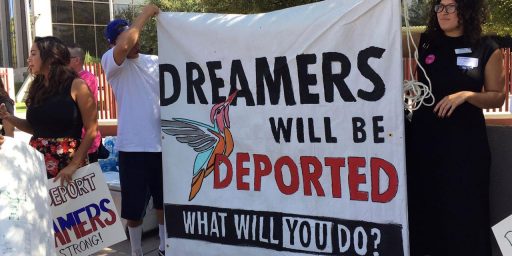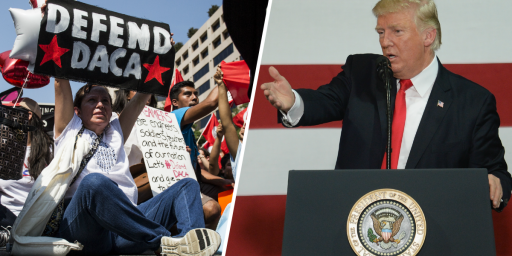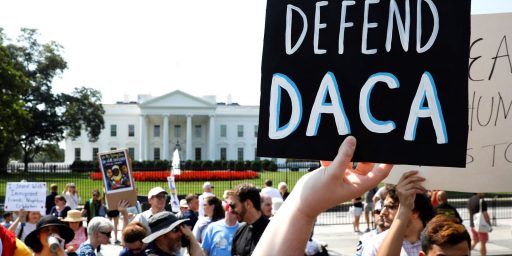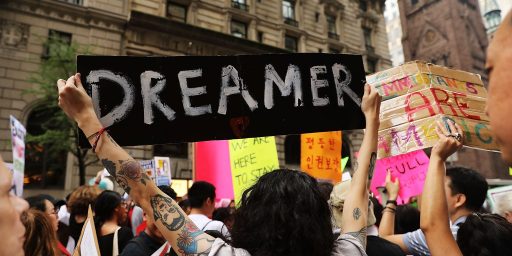Supreme Court Hears Oral Argument In DACA Challenge
The Supreme Court took up the DACA issue today. No matter what it decides, this will likely become a big issue in the 2020 elections.

As I noted yesterday, today the Supreme Court heard oral argument in a series of cases challenging the Trump Administration’s decision in September 2017 to end the Deferred Action for Childhood Arrivals (DACA) program. By the time argument was over,
The Trump administration told the Supreme Court on Tuesday that it has decided that the program that shields from deportation young undocumented immigrants brought to the United States as children should end regardless of its legality, and that there would be no point in asking it again to come up with additional justifications.
“We own this,” Solicitor General Noel Francisco told the court during a more than 80-minute oral argument over the Deferred Action for Childhood Arrivals (DACA) program, which President Barack Obama authorized through executive action in 2012 to protect law-abiding immigrants brought to the United States as children.
His arguments seemed to resonate with the court’s dominant conservatives.
Nearly 700,000 people are enrolled in the program, which provides a renewable grant of protection from deportation and carries with it work authorization. But Francisco said the Department of Homeland Security disagrees with providing such a large classification of people with immunity from laws that usually would demand their removal.
Lower courts have said that President Trump’s decision in 2017 to terminate the program was based on a faulty belief that the program was legally and constitutionally defective and that the administration has failed to provide reasons for ending it that courts and the public can judge.
Francisco disputed that. While the first memo outlining termination of the program relied exclusively on the view that the program was illegal, he said, a subsequent agenda memo invited by a judge during the litigation supplied other reasons. There would be no point in requiring the administration to repeat that step, he said.
Trump has said it is necessary for the Supreme Court to agree with the administration’s view to get congressional Democrats back to the negotiating table to come up with a more permanent solution.
In general, the court’s liberals seemed highly skeptical of the administration’s actions, while the conservatives seemed open to the idea that it had the power to terminate the program. The court’s decision is likely to take months.
Justice Sonia Sotomayor mentioned Trump directly and highlighted the president’s conflicting statements about DACA recipients.
At one point, she said, Trump told the “dreamers” that “they were safe under him,” she told Francisco. Then, abruptly, the administration said it would be ending the program in a short time, giving them “six months to destroy your lives.”
Other liberal justices also wondered whether the government has more of a responsibility to say why it was ending a program that, according to dozens of briefs in the case, universities, cities, employers and the recipients themselves have come to rely on.
But Francisco said even Obama described the program as a temporary, “stopgap” measure. Recipients must reapply every two years, he said, or the benefits expire on their own.
Washington lawyer Theodore B. Olson, arguing on behalf of a coalition of businesses, civil rights groups, universities and individuals, said DACA was different from most programs because the government “invited them into the program.” Olson, a former solicitor general under President George W. Bush, said the recipients have identified themselves and made their deportation easier.
Chief Justice John G. Roberts Jr. said deportation was unlikely — the government wouldn’t have the resources to undertake such a mass action. The real issue, he said, was work authorization.
New York Times Supreme Court reporter Adam Liptak, meanwhile, writes that it appeared from oral argument that the court’s conservative majority appeared ready to side with the Trump Administration but SCOTUSBlog’s Amy Howe described the Justices as “hard to read” in her own summary of today’s arguments:
Arguing for the federal government, U.S. Solicitor General Noel Francisco urged the justices to stay out of the fray. The administration’s decision to end DACA is not subject to judicial review at all, he suggested, because it simply ended a prior administration’s choice not to enforce immigration policy. Such a choice falls squarely within the agency’s discretion and therefore cannot be second-guessed by the courts, Francisco stressed.
Justice Ruth Bader Ginsburg was skeptical, telling Francisco that there is a “strange element” to his argument. You argue that the decision to end DACA falls within an agency’s discretion, she suggested, but at the same time you are arguing that the government was required to end DACA because the program was illegal, which would not involve any discretion at all.
Justice Samuel Alito was more sympathetic to Francisco’s contention that the decision to rescind DACA is not one that courts can review. When Theodore Olson, who argued on behalf of DACA recipients and civil rights groups, told the justices that they should start with a “strong presumption” that a federal agency’s actions are reviewable, Alito asked Olson how to draw the line in challenges to an agency’s exercise of its discretion. If a law enforcement agency has guidelines for when it will exercise its discretion not to prosecute, Alito asked, is the decision to tighten those guidelines reviewable?
Justice Neil Gorsuch was also concerned about how to draw the line between agency decisions that are and are not reviewable. He acknowledged that he was hearing a “lot of facts” and “they speak to all of us,” but he pressed Olson for a limiting principle.
The second question before the justices was whether the Trump administration’s decision to end DACA violated the law. Here the case is in a somewhat unusual posture, because everyone agrees that the administration could end DACA if it wanted to. As a result, the focus is largely on the process by which the Trump administration reached its decision, rather than the substance of the decision itself. In particular, several justices pressed Francisco on whether, before deciding to end DACA, the government had sufficiently considered the extent to which DACA recipients and others had relied on the program, and they suggested that the court should send the case back for more consideration and a better explanation than the Department of Homeland Security has provided.
Francisco resisted, telling the justices that the decision to rescind DACA would only violate the APA if the government had entirely failed to consider an important aspect of the problem before it – which it had not.
Olson and Michael Mongan, California’s solicitor general, agreed that the case should be sent back. Olson emphasized that the Trump administration did not want to take responsibility for the decision to end DACA, instead wanting to blame it on Congress and the courts. Mongan echoed that idea, arguing that sending the case back would require the Trump administration to issue a new decision that took ownership of the choice to terminate DACA.
But some justices appeared unconvinced that sending the case back to the lower courts would be a good idea or even make a difference. Gorsuch observed that the government could address the interests that would be affected by the termination of DACA in 15 pages, rather than in a paragraph, but it would take six more years, during which DACA recipients would remain in limbo. And Justice Stephen Breyer admonished Mongan that courts should not “play ping-pong with the agency.”
As I’ve noted before, it’s generally inadvisable to draw conclusions from the questions that are asked at oral argument. While they can often be a signal as to which way a particular Judge is leaning in a particular case, that isn’t always the case. In some cases, the questions that Judges ask can be based on a desire for counsel for one side or the other to clarify some point set forth in the briefs that have been filed in the case, or to more fully address an issue that has been raised in the briefs of the parties or the amicus briefs filed by outside parties who may have an interest in the case. On other occasions, it can be looked at as a means for one of the Judges to try to address concerns expressed by one of their fellow Judges on the bench. On still other occasions, a question asked may simply be based on intellectual curiosity on the part of one of the Judges.
All that being said, it seems clear from today’s argument that this is likely to be one of those cases that divides the court’s liberal and conservative wings, with the potential toss-up justice being none other than the Chief Justice himself. It’s also worth noting that there are essentially two questions before the court. The first is whether the decision to end the DACA program is subject to judicial review at all and the second is whether the Trump Administration’s decision to wind down the program was lawful.
The Trump Administration argues that the answer to the first question is that the decision is not reviewable under the law because it was based on court findings that the original DACA program, established by former President Obama in 2017 exceeded his authority and was therefore illegal. Opponents argue that the actual motives of the Administration, as shown in public and official statements, had nothing to do with the legality of the program and therefore was reviewable under the Administrative Procedure Act (APA) act. On the second question, the parties challenging the Administration’s actions argue that the manner in which the program was ended was not supported by the evidence and therefore was not lawful. Obviously, if a majority of Justices find that the decision is not reviewable then the answer to the second question becomes moot.
In any event, it is expected that the decision will not come down until some point near the end of the court’s term in June. This means that regardless of the outcome, the DACA issue will likely end up playing a role in the 2020 Presidential race regardless of what the result ends up being. We’ll find out what happens after that. In the meantime, you can learn more about the case at the SCOTUSBlog Information Page for the case.
Here’s the transcript:





I find it so amusing that the Trump Administration would argue that Obama exceeded his authority, since this is standard practice with Trump himself.
Speaking of whom, Trump claimed today that his eldest daughter Ivanka has personally, singlehandedly, created 14 million new jobs. Maybe in China.
Not quite. The position is that prosecutorial decisions, such as whether to enforce the law or not, are always per se unreviewable. The back up position is that if such a decision can in fact be reviewed the courts, then the dicey legality of DACA provides a reasonable basis for deciding to enforce the law.
Meanwhile, plaintiffs argue that the President has to have some more compelling reason to actually enforce the law as Congress has written it. Which is a bonkers position, but whatever.
While I think the administration’s motives are other than what they said they were, I think they’re nonetheless correct that 1) the DACA Executive Order exceeded President Obama’s authority and 2) an EO by one President can be overturned by the next.
Yes, the Administrative Procedures Act complicates 2). But this wasn’t a decision by the Department of Homeland Security to overturn a previous regulation or even an overturning of a regulation by President Trump. Rather, it was simply one President overturning a previous President’s decision to selectively enforce the law.
It’s all nonsense…this all comes back to the Republicans refusing to do anything to help people of any color that isn’t lily white…and being willing to do damage the economy in order to not help those people.
Entirely related, Stephen Miller’s racism on full display.
This is who they are, its what they want and will stop at nothing to reach.
@Chip Daniels: Miller is a Jew. Does he not understand that the alt-right hates Jews? Did he not hear when the tiki-torch crowd marched reciting “Jews will not replace us”?
@CSK:
He believes he’ll pass for white. His name’s Miller and he’ll tell everyone he has English heritage.
@Chip Daniels: @CSK: and the shameless White House response to this, is that the article is just an attack on him because he’s a Jew.
If that sounds really stupid it’s because they’re just trying to say something that works on the Guano types.
@James Joyner:
What’s at stake is morality, not the law. I don’t need to remind you, or others here, many of these people arrived in the US at a very early age and know no other home. Sending them “back” to their countries of birth isn’t deportation, it’s exile.
As to the law, even a misdemeanor requires intent. The DACA recipients did not intend to go to the US. So they’d be punished, and rather severely, for a situation they found themselves in through no fault of their own. That is exceedingly cruel.
@CSK:
Even the most awful regimes- especially the most awful regimes- selects a few of the oppressed class to be elevated above the rest to form an inside corps who exist in a sort of twilight state- not really a member of the elite, not really a member of the underclass, but given enough privilege to feel superior.
Miller imagines himself to be such.
What’s the proper term for Miller? An Uncle David? House Jew? Collaborator?
@Tevr: kapo will do